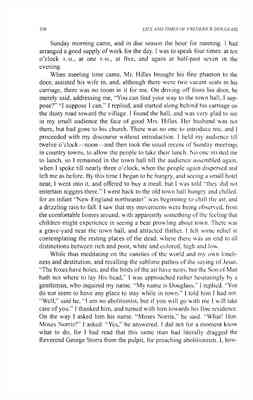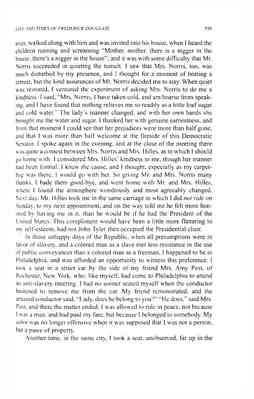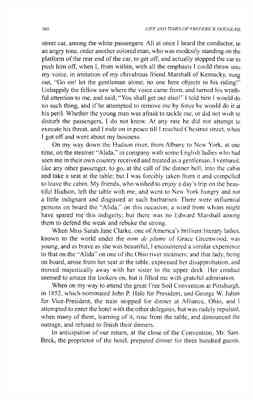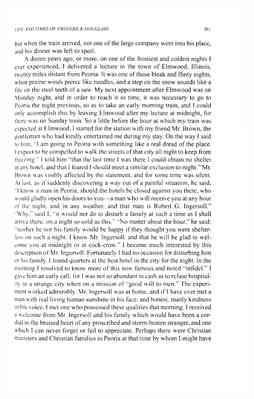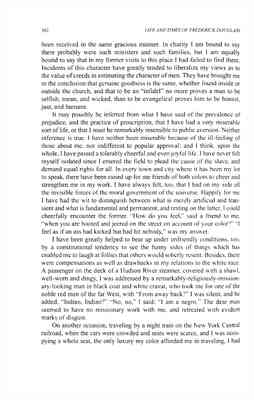Pages
206
358 LIFE AND TIMES OF FREDERICK DOUGLASS
Sunday morning came, and in due season the hour for meeting. I had arranged a good supply of work for the day. I was to speak four times: at ten o'clock A.M., at one P.M., at five, and again at half-past seven in the evening.
When meeting time came, Mr. Hilles brought his fine phaeton to the door, assisted his wife in, and, although there were two vacant seats in his carriage, there was no room in it for me. On driving off from his door, he merely said, addressing me, "You can find your way to the town hall, I suppose?" "I suppose I can,'' I replied, and started along behind his carriage on the dusty road toward the village. I found the hall, and was very glad to see in my small audience the face of good Mrs. Hilles. Her husband was not there, but had gone to his church. There was no one to introduce me, and I proceeded with my discourse without introduction. I held my audience till twelve o'clock--noon--and then took the usual recess of Sunday meetings in country towns, to allow the people to take their lunch. No one invited me to lunch, so I remained in the town hall till the audience assembled again, when I spoke till nearly three o'clock, when the people again dispersed and left me as before. By this time I began to be hungry, and seeing a small hotel near, I went into it, and offered to buy a meal; but I was told "they did not entertain niggers there." I went back to the old town hall hungry and chilled, for an infant "New England northeaster" was beginning to chill the air, and a drizzling rain to fall. I saw that my movements were being observed, from the comfortable homes around, with apparently something of the feeling that children might experience in seeing a bear prowling about town. There was a grave-yard near the town hall, and attracted thither. I felt some relief in contemplating the resting places of the dead, where there was an end to all distinctions between rich and poor, white and colored, high and low.
While thus meditating on the vanities of the world and my own loneliness and destitution, and recalling the sublime pathos of the saying of Jesus. "The foxes have holes, and the birds of the air have nests, but the Son of Man hath not where to lay His head,'' I was approached rather hesitatingly by a gentleman, who inquired my name. "My name is Douglass." I replied. "You do not seem to have any place to stay while in town." I told him I had not. "Well," said he, "I am no abolitionist, but if you will go with me I will take care of you." I thanked him, and turned with him towards his fine residence. On the way I asked him his name. "Moses Norris,'' he said. "What! Hon. Moses Norris?" I asked. "Yes," he answered. I did not for a moment know what to do, for I had read that this same man had literally dragged the Reverend George Storrs from the pulpit, for preaching abolitionism. I, how
207
LIFE AND TIMES OF FREDERICK DOUGLASS 359
ever, walked along with him and was invited into his house, when I heard the children running and screaming "Mother, mother, there is a nigger in the house, there's a nigger in the house"; and it was with some difficulty that Mr. Norris succeeded in quieting the tumult. I saw that Mrs. Norris, too, was much disturbed by my presence, and I thought for a moment of beating a retreat, but the kind assurances of Mr. Norris decided me to stay. When quiet was restored, I ventured the experiment of asking Mrs. Norris to do me a kindness. I said, "Mrs. Norris, I have taken cold, and am hoarse from speaking, and I have found that nothing relieves me so readily as a little loaf sugar and cold water." The lady's manner changed, and with her own hands she brought me the water and sugar. I thanked her with genuine earnestness, and from that moment I could see that her prejudices were more than half gone, and that I was more than half welcome at the fireside of this Democratic Senator. I spoke again in the evening, and at the close of the meeting there was quite a contest between Mrs. Norris and Mrs. Hilles, as to which I should go home with. I considered Mrs. Hilles' kindness to me, though her manner had been formal; I knew the cause, and I thought, especially as my carpetbag was there, I would go with her. So giving Mr. and Mrs. Norris many thanks, I bade them good-bye, and went home with Mr. and Mrs. Hilles, where I found the atmosphere wondrously and most agreeably changed. Next day, Mr. Hilles took me in the same carriage in which I did not ride on Sunday, to my next appointment, and on the way told me he felt more honored by having me in it, than he would be if he had the President of the United States. This compliment would have been a little more flattering to my self-esteem, had not John Tyler then occupied the Presidential chair.
In those unhappy days of the Republic, when all presumptions were in favor of slavery, and a colored man as a slave met less resistance in the use of public conveyances than a colored man as a freeman. I happened to be in Philadelphia, and was afforded an opportunity to witness this preference. I took a seat in a street car by the side of my friend Mrs. Amy Post, of Rochester, New York, who, like myself, had come to Philadelphia to attend an anti-slavery meeting. I had no sooner seated myself when the conductor hastened to remove me from the car. My friend remonstrated, and the amazed conductor said, "Lady, does he belong to you?" "He does," said Mrs. Post, and there the matter ended. I was allowed to ride in peace, not because I was a man, and had paid my fare, but because I belonged to somebody. My color was no longer offensive when it was supposed that I was not a person, but a piece of property.
Another time, in the same city, I took a seat, unobserved, far up in the
208
360 LIFE AND TIMES OF FREDERICK DOUGLASS
street car, among the white passengers. All at once I heard the conductor, in an angry tone, order another colored man, who was modestly standing on the platform of the rear end of the car, to get off, and actually stopped the car to push him off, when I, from within, with all the emphasis I could throw into my voice, in imitation of my chivalrous friend Marshall of Kentucky, sung out, "Go on! let the gentleman alone; no one here objects to his riding!" Unhappily the fellow saw where the voice came from, and turned his wrathful attention to me, and said, "You shall get out also!" I told him I would do no such thing, and if he attempted to remove me by force he would do it a his peril. Whether the young man was afraid to tackle me, or did not wish to disturb the passengers, I do not know. At any rate he did not attempt to execute his threat, and I rode on in peace till I reached Chestnut street, when I got off and went about my business.
On my way down the Hudson river, from Albany to New York, at one time, on the steamer ''Alida," in company with some English ladies who had seen me in their own country received and treated as a gentleman, I ventured, like any other passenger, to go, at the call of the dinner bell, into the cabin and take a seat at the table: but I was forcibly taken from it and compelled to leave the cabin. My friends, who wished to enjoy a day's trip on the beautiful Hudson, left the table with me, and went to New York hungry and not a little indignant and disgusted at such barbarism. There were influential persons on board the "Alida," on this occasion, a word from whom might have spared me this indignity; but there was no Edward Marshall among them to defend the weak and rebuke the strong.
When Miss Sarah Jane Clarke, one of America's brilliant literary ladies, known to the world under the nom de plume of Grace Greenwood, was young, and as brave as she was beautiful, I encountered a similar experience to that on the "Alida'' on one of the Ohio river steamers; and that lady, being on board, arose from her seat at the table, expressed her disapprobation, and moved majestically away with her sister to the upper deck. Her conduct seemed to amaze the lookers on, but it filled me with grateful admiration.
When on my way to attend the great Free Soil Convention at Pittsburgh, in 1852, which nominated John P. Hale for President, and George W. Julian for Vice-President, the train stopped for dinner at Alliance, Ohio, and I attempted to enter the hotel with the other delegates, but was rudely repulsed, when many of them, learning of it, rose from the table, and denounced the outrage, and refused to finish their dinners.
In anticipation of our return, at the close of the Convention, Mr. Sam. Beck, the proprietor of the hotel, prepared dinner for three hundred guests.
209
LIFE AND TIMES OF FREDERICK DOUGLASS 361
but when the train arrived, not one of the large company went into his place, and his dinner was left to spoil.
A dozen years ago, or more, on one of the frostiest and coldest nights I ever experienced, I delivered a lecture in the town of Elmwood, Illinois, twenty miles distant from Peoria. It was one of those bleak and flinty nights when prairie winds pierce like needles, and a step on the snow sounds like a tile on the steel teeth of a saw. My next appointment after Elmwood was on Monday night, and in order to reach i in time, it was necessary to go to Peoria the night previous, so as to take an early morning train, and I could only accomplish this by leaving Elmwood after my lecture at midnight, for there was no Sunday train. So a little before the hour at which my train was expected at Elmwood, I started for the station with my friend Mr. Brown, the gentleman who had kindly entertained me during my stay. On the way I said to him, "I am going to Peoria with something like a real dread of the place. I expect to be compelled to walk the streets of that city all night to keep from freezing." I told him "that the last time I was there I could obtain no shelter at any hotel, and that I feared I should meet a similar exclusion to-night." Mr. Brown was visibly affected by the statement, and for some time was silent. At last, as if suddenly discovering a way out of a painful situation, he said, "I know a man in Peoria, should the hotels be closed against you there, who would gladly open his doors to you--a man who will receive you at any hour of the night, and in any weather, and that man is Robert G. Ingersoll." "Why," said I, "it would not do to disturb a family at such a time as I shall arrive there, on a night so cold as this." "No matter about the hour," he said; "neither he nor his family would be happy if they thought you were shelterless on such a night. I know Mr. Ingersoll, and that he will be glad to welcome you at midnight or at cock-crow." I became much interested by this description of Mr. Ingersoll. Fortunately I had no occasion for disturbing him or his family. I found quarters at the best hotel in the city for the night. In the morning I resolved to know more of this now famous and noted "infidel." I gave him an early call, for I was not so abundant in cash as to refuse hospitality in a strange city when on a mission of "good will to men." The experiment worked admirably. Mr. Ingersoll was at home, and if I have ever met a man with real living human sunshine in his face, and honest, manly kindness in his voice. I met one who possessed these qualities that morning. I received a welcome from Mr. Ingersoll and his family which would have been a cordial to the bruised heart of any proscribed and storm-beaten stranger, and one which I can never forget or fail to appreciate. Perhaps there were Christian ministers and Christian families in Peoria at that time by whom I might have
210
362 LIFE AND TIMES OF FREDERICK DOUGLAS
been received in the same gracious manner. In charity I a bound to say there probably were such ministers and such families, but I am equally bound to say that in my former visits to this place I had failed to find them. Incidents of this character have greatly tended to liberalize my views as to the value of creeds in estimating the character of men. The have brought me to the conclusion that genuine goodness is the same, whether found inside or outside the church, and that to be an "infidel" no more proves a man to be selfish, mean, and wicked, than to be evangelical proves him to be honest, just, and humane.
It may possibly be inferred from what I have said of the prevalence of prejudice, and the practice of proscription, that I have had a very miserable sort of life, or that I must be remarkably insensible to public aversion. Neither inference is true. I have neither been miserable because of the ill-feeling of those about me, nor indifferent to popular approval; and I think, upon the whole, I have passed a tolerably cheerful and even joyful life. I have never felt myself isolated since I entered the field to plead the cause of the slave, and demand equal rights for all. In every town and city where it has been my lot to speak, there have been raised up for me friends of both colors to cheer and strengthen me in my work. I have always felt, too, that I had on my side all the invisible forces of the moral government of the universe. Happily for me I have had the wit to distinguish between what is merely artificial and transient and what is fundamental and permanent; and resting on the latter, I could cheerfully encounter the former, "How do you feel," said a friend to me, "when you are hooted and jeered on the street on account of your color?" "I feel as if an ass had kicked but had hit nobody," was my answer.
I have been greatly helped to bear up under unfriendly conditions, too, by a constitutional tendency to see the funny sides of things which has enabled me to laugh at follies that others would soberly resent. Besides, there were compensations as well as drawbacks in my relations to the white race. A passenger on the deck of a Hudson Rive steamer, covered with a shawl, well-worn and dingy, I was addressed by a remarkably-religiously-missionary-looking man in black coat and white cravat, who took me for one of the noble red men of the far West, with "From away back?" I was silent, and he added, "Indian, Indian?" "No, no," I said; "I am a negro." The dear man seemed to have no missionary work with me, and retreated with evident marks of disgust.
On another occasion, traveling by a night train on the New York Central railroad, when the cars were crowded and seats were scarce, and I was occupying a whole seat, the only luxury my color afforded me in traveling, I had
